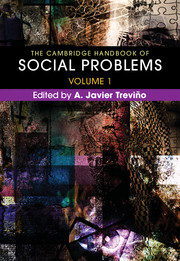Book contents
- The Cambridge Handbook of Social Problems
- The Cambridge Handbook of Social Problems
- Copyright page
- Contents
- About the Contributors
- Introduction
- Part I General Concerns and Orientations in the Study of Social Problems
- Chapter 1 The Challenges of Conceptualizing Social Problems
- Chapter 2 Research Methods
- Chapter 3 Participatory Action Research and Social Problems
- Chapter 4 Public Policy and Social Problems: Recent Trends in the Formal Control of Individual Behavior
- Chapter 5 Social Problems in Global Perspective
- Chapter 6 Bridging Social Movements and Social Problems
- Chapter 7 Public Sociology and Social Problems
- Chapter 8 Service Sociology and Social Problems*
- Chapter 9 Astrosociology: Social Problems on Earth and in Outer Space
- Chapter 10 Prospects for the Sociological Study of Social Problems*
- Part II Historical and Theoretical Issues in the Study of Social Problems
- Part III Problems of Discrimination and Inequality
- Part IV Problems of Institutions
- Index
- References
Chapter 1 - The Challenges of Conceptualizing Social Problems
from Part I - General Concerns and Orientations in the Study of Social Problems
Published online by Cambridge University Press: 16 March 2018
- The Cambridge Handbook of Social Problems
- The Cambridge Handbook of Social Problems
- Copyright page
- Contents
- About the Contributors
- Introduction
- Part I General Concerns and Orientations in the Study of Social Problems
- Chapter 1 The Challenges of Conceptualizing Social Problems
- Chapter 2 Research Methods
- Chapter 3 Participatory Action Research and Social Problems
- Chapter 4 Public Policy and Social Problems: Recent Trends in the Formal Control of Individual Behavior
- Chapter 5 Social Problems in Global Perspective
- Chapter 6 Bridging Social Movements and Social Problems
- Chapter 7 Public Sociology and Social Problems
- Chapter 8 Service Sociology and Social Problems*
- Chapter 9 Astrosociology: Social Problems on Earth and in Outer Space
- Chapter 10 Prospects for the Sociological Study of Social Problems*
- Part II Historical and Theoretical Issues in the Study of Social Problems
- Part III Problems of Discrimination and Inequality
- Part IV Problems of Institutions
- Index
- References
Summary
The sociological study of social problems is reviewed in terms of the question of conceptualizing the key term social problems as a technical term in the discipline and beyond. Dilemmas brought by the very word problem, by who uses it and how, are considered. Against a dominant tradition of the sociologist using the term normatively, elements of the definitional approach proposed by Malcolm Spector and John Kitsuse are reviewed as the most analytically sound conceptualization of the last century, still offering promise. That argument is then linked to work in science studies and the respecification of sociology by Bruno Latour to suggest a revitalized study of social problems and sociology.
- Type
- Chapter
- Information
- The Cambridge Handbook of Social Problems , pp. 3 - 22Publisher: Cambridge University PressPrint publication year: 2018
References
- 5
- Cited by

